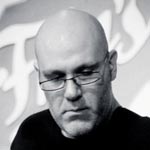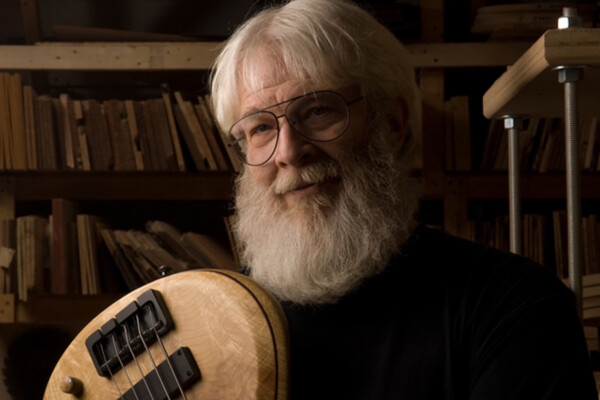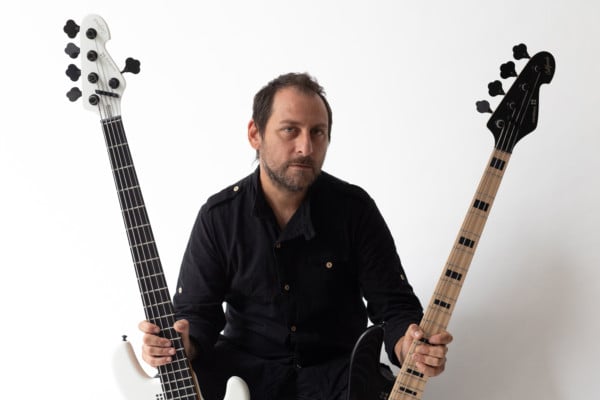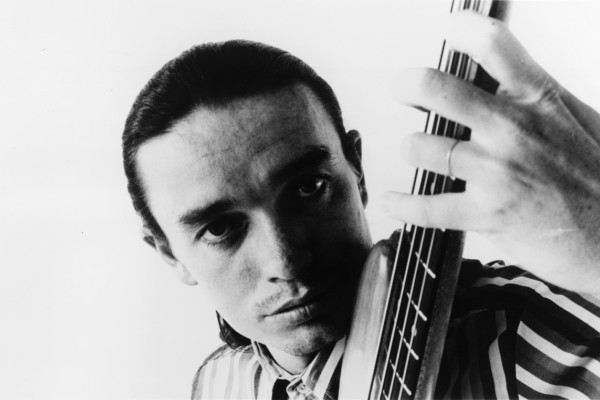Seeing Through Hearing
I’m an ear player…
By that I mean I’m good at hearing something and responding intuitively to it on my bass, without necessarily knowing exactly what I’m doing. This has been both advantageous AND a disability to me. Below I’ve listed some of the pros and cons of being this kind of a player. See if you identify with any of them. Hopefully I’m being open enough for you to do so.
Improvisation
This is a double-edged sword of sorts. On the one hand, playing intuitively by ear alone means I am free to play whatever I feel, without musical boundaries. It also means that I can kind of ‘gel’ quickly with others in a jam session or band situation and can feel my way through changes in progressions and rhythms. On the other hand I can be at a disadvantage in that if told beforehand, “We’re gonna be improvising over such-and-such modes, using such-and-such scales”, I would be asking for help quite quickly!
Writing
When composing music, I have always felt my intuitive methods (if you can call them that) have been a great help to me. Being able to play a few different instruments also means that I can effectively ‘jam’ with myself on whatever ideas spring to mind until I have something I think is worth keeping. Of course being able to hear where a composition may need to go next in my head, then to articulate that into actual playing has been a real asset. Where I think I fall down is when I try to rationalize what I do. For example, if asked to transcribe what I have produced it would take me a VERY long time to work it all out.
Practice Time
Practice time is a real interesting one. I mean, WHAT do I practice? Something in the back of my mind is saying, “Reading, scales, arpeggios, left-hand tech, right hand tech, theory!” All well and good and I would agree, ultimately rewarding! However I seem to have this drive to always be creating something new – a kind of wanderlust, if you will. My practice times invariably therefore consist of constantly creating new music. Sometimes it works and sometimes it doesn’t. I still get to work on technique and dexterity etc., in that sometimes I want to play something I can’t at first, so have to work at it. When I have tried (and I will again) to ‘get back to the basics’ of theory, it’s been a grind. I know I need discipline in this whole area.
Session Work
I’ve played on several albums where I haven’t heard the tracks until the day of the recording. Usually I get several run-through’s to ‘get it under my fingers,’ and in most cases this is enough. Where I have come unstuck is when I’ve been presented with a sheet of dots! Now I know the notes enough to take it away for a while and learn it, but to sight-read on spec, this I cannot do (at the moment). It can therefore get rather embarrassing when I have to get the section played to me by someone who does read well until I have learned it.
Technology
Now this feeds my insatiable desire for experimentation and freedom to explore without boundaries! I think it is because through use of technology, I am producing music that is in of itself difficult to classify and to write down. From live-looping to effects, I find myself embracing new and wonderful sounds that I can create, oftentimes on the spur of the moment. Technology has extended the bass into a whole new universe of expression. The flip-side of this is that I can become dependent. I think there might be a healthy compromise between ‘out there’ and grass roots depth and knowledge of one’s art.
A Real-Life Example
My wife Jayne is a classically trained pianist. The one time we were playing together and I played a note that didn’t ‘in theory’ fit with what where the piece was going, she stopped and said, “You can’t play that note there”. My response was, “I just did!”
We had met as two musical polar opposites – Jayne as someone who could sight read orchestral staves incredibly well, but couldn’t improvise because the knowledge stifled her; and me as someone who could only improvise and had no proper ‘grounding’ if you will. The Holy Grail, I would guess, is somewhere in the center.
So…
Back in the day, I could basically sight read bass and treble clef, but as the saying goes… “If you don’t use it, you lose it!”. Are you an ear player, a notation reader, a tab reader or a mixture of these? Do you identify with anything I’ve said? Can you bare your soul? Please post a comment; I would be very interested to hear what you have to say.




I learned very much by ear. Like you say, there are advantages and disadvantages. At the same time, I taught myself theory from the earliest days and applied it (badly at first). I taught myself to read (slowly) but I can’t really sight read. Over the years I have tried to develop by reading but I’ve so rarely had to sight read in a gig or recording situation. It’s cost me only a few gigs but some of those have been big money ones.
If I see a chart though, I know what to play and if I get a score in advance, I memorise it enough to be able to ‘read’ it on stage or elsewhere. I do value reading though and I’d encourage any musician to skill themself up with it.
My attitude has always been ‘learn the rules and then break them’ as knowledge is always good but I dig the Mick Karn approach (Mick claims not to know what any of the notes are called on the neck) as much as the studied, schooled method.
I think that since I started studying at academies, trying to read working and with a range of teachers my playing got a lot more versatile but I’m glad I got a bit of a unique voice as a self-taught ‘ear’ player.
I started young as just a reader. I had a great guitar teacher who taught me “keep a toolbox” meaning be able understand notation, tab, chord changes, but most important develop a good ear.
What I’ve gathered which I think is really cool: If I’m site reading, I’m playing exactly what the conductor/songwriter wants and we don’t clash…but I’m NOT able to listen to the band around me as much. Having a great ear allows me to get up with a band with only “Slow song in G” and I can follow and I am fully relying on the band to give me the energy of the song to work with.
The other day a friend invited me over to walk some standards at a very slow tempo. I was HORRIBLE at it, but it just goes to show what wasn’t in my practice vocabulary. I like to get stuck in those spots, because if you’re honest with your playing it will show you what to practice. This past week I played standards at 35bpms for 10 minutes a day and now I can say that tool is sharpened and ready.
Well, I can identify with many things you pointed at in this article. I started as an ear player, 27 years ago, and stayed like that for about ten years. As I went to have (few) classes, my musical world went way broadened, as I was now able to understand what the sequence “1-4-5” means, for example. Or how to play over chords, and what they mean; even if I don’t give a damn to formal advanced harmony theory, it’s fine to COMMUNICATE with other musicians. I think art is all about it, isn’t it? COMMUNICATION and EXPRESSION. All that helps and doesn’t stand in the way is welcome.
Thanks for the good article!
It all starts and ends with the ear, which is not to say that theory, reading, etc isn’t important. It is. All those will make you a better player. But without the ear, you’ve got nothing. Like I tell my kids, if you want to be a good writer, be a good reader. Likewise, if you want to be a good music player, be a good music listener.
Fabulous comments. Thank you all for your insights!
[…] Read the full article here: http://www.notreble.com/buzz/2010/06/21/seeing-through-hearing/ […]
I mostly play by ear. I know some theory , scales, modes, chord construction, etc, but i’ve never had to read music on any gig i’ve ever done. I can read some, but i’m extremely slow at it. Unfortunately, because i don’t read well, i lost the chance at two gigs because they required good sightreading skills, so i’m going to work on my reading more. Ironically, the one time i was handed some sheet music , i already knew the song because i had learned it by ear, so i didn’t need it.
I am now trying to practice songs, pieces of music, and relearning how to read, bass and treble clef. I am a 43 year old amateur, and may never be no more than an amateur, but I want to be the best musician I can be. A little formal practice every day will help me get and stay better than I was.
Wow, yes, there are advantages and disadvantages to reading/playing by ear. I learned how to play the violin years ago, therefore I used the classical reading approach. When I picked up the bass, I used the same approach. I get what it means to play by ear, and can do it. However, I need to practice more at it. I also get which notes go together and which ones don’t because I can read. Because of this, I am able to come up with a piece of music without having to use a lot of guesswork that a person playing by ear would-because I already know what notes go with what. And, that’s what a lot of people don’t get that play by ear. They think it will take me a long time to figure something out because I am a reader, but that’s not the case. Unfortunately, the bands I have tried out with so far just want me to show up and ‘wing it’-to play songs I haven’t played before without being told what we are going to practice in advance. Being that I am a reader, I can’t do that. So, I continue to play alone.
I used to be able to only read music. Learned on piano, than played sax. Put a sheet of music in front of me, I could play the heck out of it. But w/o written music, I was at a loss, didn’t trust myself. This doesn’t work too well in jazz contexts, if you can’t improvise!
Then I started learning djembe with west african teachers, and nothing is written. I learned to use my ears. Now I play kora. Nothing is written. I use my ears. I’m much happier, and a better musician. But over the years I’ve lost my ability to read bass clef–just not using written music enough to keep it up.
When i still played at the BigBand at my Highschool i was really badas at sight reading even complicated parts. I didn’t even had to read the notes specifically. I knew what was comming just fom the context. But now after i left the Band my skills flow away like icecream in the sun. And now i can only sight read chords ands tabs. I miss the good old days :-/